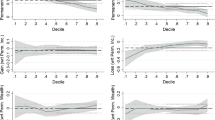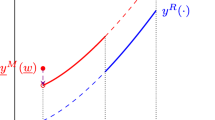Abstract
The Mertonian starting idea for this paper is St. Anselm's idea that the will has two inclinations: an affection for what is to the person's own advantage and an affection for justice. We show that in decision-making situations, where the individual must choose a course of action from among a set of alternatives, the individual, subject to the two inclinations and thus guided by the twin considerations of own good and the common good as he/she forms the preference orderings for the alternatives, is in one of three states: (i) the state of Harmony, defined by perfect coincidence of the orderings induced by the two criteria; (ii) the state of Conflict, defined by perfect reversal of the orderings; and (iii) the state of Ambiguity, defined by ordering-pairs which are neither identical nor exactly opposite. The most general result states that if the number of alternatives is two, then the individual is in either Harmony or Conflict; if, however, the number of alternatives exceeds two, then Ambiguity is also a possible outcome. We then apply the framework to the case of choosing an income distribution, letting the own-good and common-good criteria dictate orderings based on personal outcomes (such as own income or own income rank) and social outcomes (such as mean income or income inequality), respectively, and examining the relation between the two orderings in five families of probability distributions. In the special case where own good is an increasing function of own income and the common good is a decreasing function of income inequality, our results show that each society has a group in Harmony (the poorest group) and one additional group, either in Conflict or in Ambiguity. Finally, we speculate about the behavioral and social implications of the three states and their configurations in the population.
Similar content being viewed by others
References
Binmore, K. G. (1980).The Foundations of Analysis: A Straightforward Introduction. Book 1: Logic, Sets and Numbers, Cambridge University Press, Cambridge, England.
Butler, J. (1897).The Complete Works of Joseph Butler, In Gladstone, W. E. (ed.), Oxford University Press, Oxford, United Kingdom. (Original work 1726–1752).
Charlesworth, M. J. (1965).Introduction and Philosophical Commentary. St. Anselm's Proslogion, Charlesworth, M. J. (trans.), Oxford University Press, Oxford, England.
Comte, A. (1877).Cours de Philosophie Positive, 6 vols., Baillière, Paris, France. (Original work published 1830–1842).
Dobzhansky, T. (1968). Evolution: Evolution and behavior. In Sills, D. L., (ed.),International Encyclopedia of the Social Sciences, Vol. 5, Macmillan, New York, pp. 234–238.
Duns Scotus, J. (1986).Duns Scotus on the Will and Morality, Wolter, A. B. (trans.), Catholic University of America Press, Washington, DC (Original work ca. 1300–1308).
Durkheim, É. (1951).Suicide: A Study in Sociology, Spaulding J. A., and Simpson, G. (trans.); Simpson, G. (ed.), Free Press, New York. (Original work published 1897).
Edwards, W. (1968). Decision making: Psychological aspects. In Sills, D. L. (ed.),International Encyclopedia of the Social Sciences, Vol. 4, Macmillan, New York, pp. 34–42.
Etzioni, A. (1988).The Moral Dimension: Toward a New Economics, Free Press, New York.
Eubank, R. L. (1988). Quantiles. In Kotz, S., Johnson, N. L., and Read, C. B. (eds.),Encyclopedia of Statistical Sciences, Vol. 7, Wiley, New York, pp. 424–432.
Gregory the Great (1844).Patrologia Latina, Vols. 75–79, Migne, J. P. (ed.), Paris. (Original work 540–604).
Hammond, P. J. (1987). Altruism. In Eatwell, J., Milgate, M., and Newman, P. (eds.),The New Palgrave: A Dictionary of Economics, Vol. 1, Macmillan, London, pp. 85–87.
Hirschman, A. O. (1977).The Passions and the Interests: Political Arguments for Capitalism Before Its Triumph, Princeton University Press, Princeton, NJ.
Hirschman, A. O. (1987). Interests. In Eatwell, J., Milgate, M., and Newman, P. (eds.),The New Palgrave: A Dictionary of Economics, Vol. 2, Macmillan, London, pp. 882–887.
Hobbes, T. (1952).Leviathan, Fuller, N. (ed.), Britannica, Chicago. (Original work published 1651)
Hogarth, R. M., and Reder, M. W. (eds.). (1986).Rational Choice: The Contrast Between Economics and Psychology, University of Chicago Press, Chicago.
Hutcheson, F. (1969–1971).Collected Works. Facsimile editions prepared by B. Fabian. Seven volumes. G. Olms. Hildesheim, West Germany. (Original work written 1725–1746, published 1725–1755).
Jasso, G. (1983). Using the inverse distribution function to compare income distributions and their inequality.Res. Soc. Stratif. Mobility 2: 271–306.
Jasso, G. (1984). Equity, inequality, and self-interest: Voting for an income distribution. Paper presented at the North American Winter Meeting of the Econometric Society, Dallas, Texas, December. [Earlier versions were presented at the Annual Meeting of the American Sociological Association, Toronto, Canada, August 1981, and at the European Meeting of the Econometric Society, Madrid, Spain, August 1984.]
Johnson, N. L., and Kotz, S. (1970a).Distributions in Statistics: Continuous Univariate Distributions — 1, Houghton Mifflin, Boston.
Johnson, N. L. and Kotz, S. (1970b).Distributions in Statistics: Continuous Univariate Distributions — 2, Houghton Mifflin, Boston.
Klamer, A. (1989). Conversation with Amartya Sen.J. Econ. Perpect. 3: 135–150.
Kotz, S., Johnson, N. L., and Read, C. B. (1982–1988). Conjugate Ranking. In Kotz, S., Johnson, N. L., and Read, C. B. (eds.),Encyclopedia of Statistical Sciences, Vol. 2, Wiley, New York, p. 145.
Kristol, I. (1968). Equality: Equality as an ideal. In Sills, D. L. (ed.),International Encyclopedia of the Social Sciences, Vol. 5, Macmillan, New York, pp. 108–111.
MacIntyre, A. (1967). Egoism and altruism. In Edwards, P. (ed.),The Encyclopedia of Philosophy, Vol. 2, Macmillan, New York, pp. 462–466.
MacPherson, C. B. (1987). Individualism. In Eatwell, J., Milgate, M., and Newman, P. (eds.),The New Palgrave: A Dictionary of Economics, Vol. 2, Macmillan, London, pp. 790–793.
Marschak, J. (1968). Decision making: Economic aspects. In Sills, D. L. (ed.),International Encyclopedia of the Social Sciences, Vol. 4, Macmillan, New York, pp. 42–55.
Monro, D. H. (1987). Self-interest. In Eastwell, J., Milgate, M., and Newman, P. (eds.),The New Palgrave: A Dictionary of Economics, (Vol. 4). Macmillan, London, pp. 297–300.
Myers, M. L. (1983).The Soul of Modern Economic Man: Ideas of Self-Interest, Thomas Hobbes to Adam Smith, University of Chicago Press, Chicago.
Oppenheim, F. (1968). Equality: The concept of equality. In Sills, D. L. (ed.),International Encyclopedia of the Social Sciences, Vol. 5, Macmillan, New York, pp. 102–108.
Parsons, T. (1951).The Social System, Free Press, New York.
Parsons, T. (1968). Durkheim, Émile. In Sills, D. L. (ed.),International Encyclopedia of the Social Sciences, Vol. 4, Macmillan, New York, pp. 311–320.
Plato. (1952).The Dialogues of Plato. Jowett, B. (trans.), Britannica, Chicago. (Original work 4th century B.C.)
Rawls, J. (1971).A Theory of Justice, Harvard University Press, Cambridge, MA.
Robinson, J. A. (1968). Decision making: Political aspects. In Sills, D. L. (ed.),International Encyclopedia of the Social Sciences, Vol. 4, Macmillan, New York, pp. 55–62.
Schumpeter, J. A. (1954).History of Economic Analysis, Schumpeter, E. B. (eds.), Oxford University Press, New York.
Shaftesbury, Third Earl of (Anthony Ashley Cooper). (1964).Characteristics of Men, Manners, Opinions, Times. Bobbs-Merrill, Indianapolis. (Original work 1699–1711; edited by J. M. Robertson 1900.)
Smith, A. (1974).The Theory of Moral Sentiments, Macfie, A. L., and Raphael, D. D. (eds.), Clarendon Press, Oxford, England. (Original work published 1759)
Smith, A. (1976).An Inquiry into the Nature and Causes of the Wealth of Nations, Campbell, R. H., Skinner, A. S., and Todd, W. B. (eds.), Clarendon Press, Oxford, England. (Original work published 1776)
Southern, R. W. (1963).St. Anselm and His Biographer, Cambridge University Press, Cambridge, England.
St. Anselm of Canterbury. (1946–1961).Opera Omnia, Schmitt, F. S. (ed.), Thomas Nelson, Edinburgh, Scotland. (Original work 1070–1109)
St. Anselm of Canterbury. (1967).Truth, Freedom, and Evil: Three Philosophical Dialogues, Hopkins, J., and Richardson, H. (eds. and trans.), Harper Torchbooks, New York. (Original work 1080–1090)
St. Thomas Aquinas. (1952).Summa Theologica, 2 vols. (Fathers of the English Dominican Province, trans. D. J. Sullivan), Britannica, Chicago. (Original work 1267–1273)
Wiley, N. (dy1989). Peirce, Mead, and the internal conversation. Paper presented to the Workshop in Theoretical Analysis, University of Iowa, March.
Wispé, L. G. (1968). Sympathy and empathy. In Sills, D. L. (ed.),International Encyclopedia of the Social Sciences, Vol. 15, Macmillan, New York, pp. 441–447.
Wolter, A. B. (1967). Duns Scotus, John. In Edwards, P. (ed.),The Encyclopedia of Philosophy, Vol. 2, Macmillan, New York, pp. 427–436.
Wolter, A. B. (1986). Introduction. In Duns Scotus, J.,Duns Scotus on the Will and Morality, Catholic University of America Press, Washington, DC, pp. 1–123.
Zagorin, P. (1968). Hobbes, Thomas. In Sills, D. L. (ed.),International Encyclopedia of the Social Sciences, Vol. 6, Macmillan, New York, pp. 481–486.
Author information
Authors and Affiliations
Rights and permissions
About this article
Cite this article
Jasso, G. Self-interest, distributive justice, and the income distribution: A theoretical fragment based on St. Anselm's postulate. Soc Just Res 3, 251–276 (1989). https://doi.org/10.1007/BF01048452
Issue Date:
DOI: https://doi.org/10.1007/BF01048452




